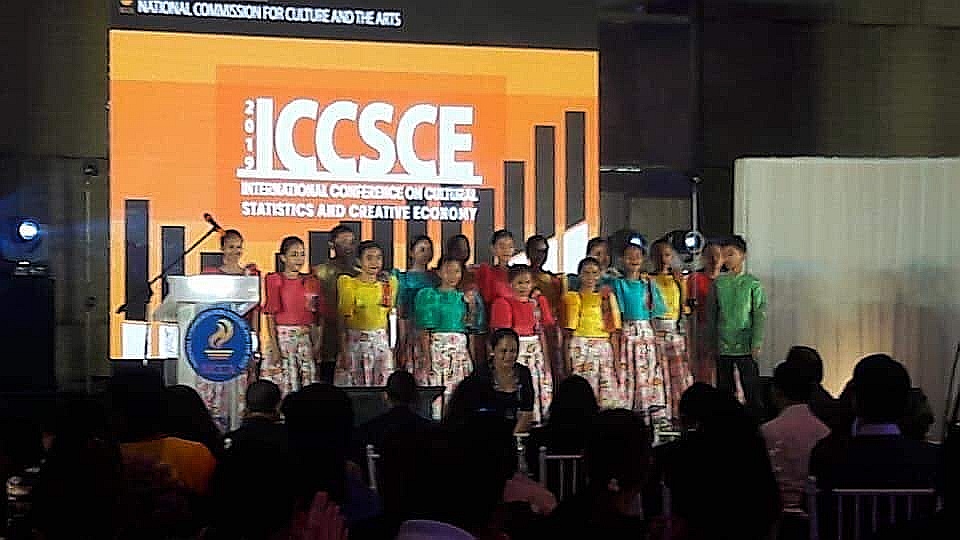NCCA encourages LGUs to develop creative economy

Bohol’s Loboc Children’s Choir leads the singing of the invocation and the Philippine National Anthem during the opening ceremony of the International Conference on Cultural Statistics and Creative Economy on Monday, October 14, at the Waterfront Cebu City Hotel and Casino. | CONTRIBUTED PHOTO / Marlene De Guzman Mina
CEBU CITY, Philippines — Local governments have an important role to play in developing a creative economy.
To fuel the creative sector, National Commission for Culture and the Arts (NCCA) executive director Al Ryan Alejandre said they have been conducting seminars on the importance of culture and arts as a contributor to the economy.
However, some local executives do not consider the creative sector as a priority, said Alejandre.
He said changes in local government leadership also makes it difficult to sustain programs that promote the creative sector.
Marichu Tellano, NCCA deputy executive director, also explained the need for LGUs to recognize that the promotion of culture and arts could boost development in their respective areas.
The NCCA led the two-day 2019 International Conference on Cultural Statistics and Creative Economy, which drew around 450 participants composed of local government officials, cultural officers and tourism officers, focused mainly on how culture contributes to the development.
The conference was held from October 14 to 15 at the Waterfront Cebu City Hotel and Casino.
It provided a venue for local researchers to showcase how their researches contributed to policy-making and planning.
According to a profile on the country’s creative industries prepared by the British Council, the Philippines has not been able to transform creative products into substantial domestic markets and exports.
This would have resulted in job creation and substantial contribution to the economy.
Creative products include a piece of music, clothing, sculpture, a film, a game or a building.
The British Council noted that the creative industries could provide important opportunities to the Philippines. It noted that the country has deeply rooted tradition in music, performing arts, craft, design and film.
The National Commission for Culture and the Arts (NCCA) urges local government executives to prioritize culture and arts to promote a creative economy, according to NCCA executive director Al Ryan Alejandre (left). Also in photo are H.E. Shahbaz Khan (middle), director of Regional Science Bureau for Asia and the Pacific and Unesco representative for Brunei Darussalam, Indonesia, Malaysia, Philippines and Timor-Leste, and NCCA deputy executive director Marichu Tellano (right). | CDND PHOTO / Irene R. Sino Cruz[/caption]
Based on the British Council study, the “Philippines appears to be globally competitive in the handicrafts and cultural event segments.”
Because of this, the country has potential to further improve its global positioning for the handicrafts, cultural events, and art segments.
The country’s emerging creative industries include visual arts, creative services such as publishing (including digital content); audiovisual (including animation and online broadcast materials from film, television and radio broadcasts); and design (including interior, graphic, and fashion design).
Other creatives industries are new media including software goods and services, and videogames (also called entertainment software) and additional creative services such as architectural, advertising, and other cultural content services.
Cebu City has applied before the United Nations Educational, Scientific and Cultural Organization (Unesco) to be recognized as a creative city.
Tellano said they are also encouraging other cities to apply with Unesco so they can become creative cities too.
There are 180 creative cities worldwide, which comprise the UNESCO Creative Cities Network (UCCN).
This network aims to place creativity and cultural industries at the heart of their development plans at the local level while cooperating actively at the international level. / celr
Disclaimer: The comments uploaded on this site do not necessarily represent or reflect the views of management and owner of Cebudailynews. We reserve the right to exclude comments that we deem to be inconsistent with our editorial standards.
